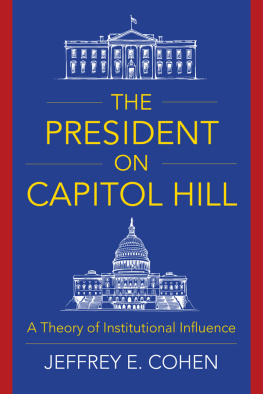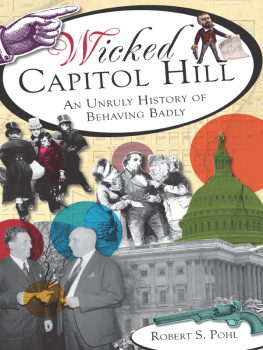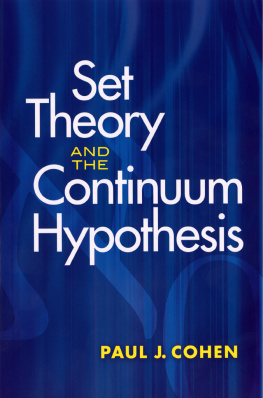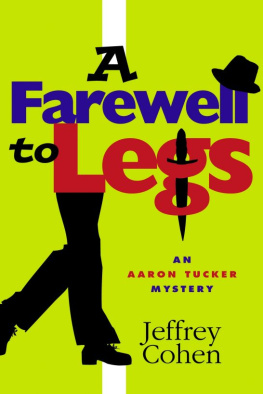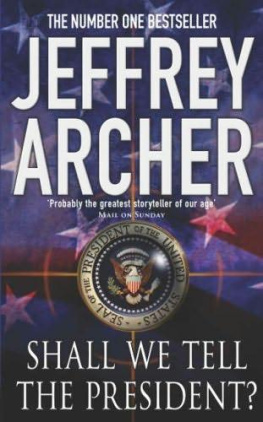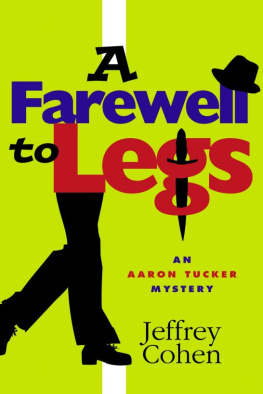Columbia University Press
Publishers Since 1893
New York Chichester, West Sussex
cup.columbia.edu
Copyright 2019 Columbia University Press
All rights reserved
E-ISBN 978-0-231-54819-9
Library of Congress Cataloging-in-Publication Data
Names: Cohen, Jeffrey E., author.
Title: The president on Capitol Hill : a theory of institutional influence / Jeffrey E. Cohen.
Description: New York : Columbia University Press, [2019] | Includes bibliographical references and index.
Identifiers: LCCN 2018040235 (print) | LCCN 2018046015 (ebook) | ISBN 9780231189149 (cloth : acid-free paper) | ISBN 9780231189156 (pbk.)-Subjects: LCSH: PresidentsUnited States. | Executive-legislative relationsUnited States. | Executive powerUnited States. | United States. CongressVoting.
Classification: LCC JK585 (ebook) | LCC JK585 .C557 2019 (print) | DDC 328.73/07456dc23
LC record available at https://lccn.loc.gov/2018040235
A Columbia University Press E-book.
CUP would be pleased to hear about your reading experience with this e-book at .
Cover design: Milenda Nan Ok Lee
Cover art: Shutterstock
T his book was a long time in the making, the seeds planted when I was a graduate student, more than forty years ago. Over the years, I have benefited immensely from having a large number of colleagues who generously offered their time to listen to my ideas and projects, offering advice, support, and inspiration. Three stand out for the numerous conversations about the presidency and about doing research on the presidency, and for their collegiality and friendshipRichard Fleisher, Jon Bond, and George Edwards. Although at times I take on some of their important work, this book would not have been possible without their prior research. I also want to thank one of my erstwhile coauthors, Brandon Rottinghaus, who patiently listened to me prattle on about this project.
The readers for Columbia University Press, Sharece Thrower of Vanderbilt University and Douglas Kriner of Cornell University, deserve a thank you. Their suggestions greatly improved this book. Stephen Wesley, the political science editor, also merits singling out for his enthusiasm and patience. Unlike many presses these days, Columbia University Press not only makes quality research a top priority but also pours generous resources into book preparation and production. It has been a joy to work with the press and its staff.
Finally, this book is dedicated to PJ. With all my love.
I n their seminal study The President in the Legislative Arena , Jon R. Bond and Richard Fleisher make the important conceptual distinction between presidential success and influence in Congress. Prior to their work, scholars often used the terms influence and success interchangeably.
Bond and Fleisher (1990) argue that the question of success is broader and thus more important than the question of influence (ix). Success, they argue, ultimately relates to the production of public policies and thus has important implications for democratic theory as well as for representation, responsiveness, and accountability. Much research on presidentialcongressional relations has followed Bond and Fleishers lead, focusing on success rather than influence. The President in the Legislative Arena has made a seminal contribution to and produced a lasting legacy for the study of presidentialcongressional relations.
Bond and Fleisher are undeniably correct that it is important to study success. But just as an exclusive focus on presidential influence may be too narrow, as Bond and Fleisher argue, because it neglects the question of success and policy production, an exclusive focus on success to the neglect of influence may also be too narrow, to the detriment of a fuller understanding of presidentialcongressional relations, especially the linkage between influence and success.
Consider, for instance, some implications of studying only presidential success. First, studies tend to find that important factors accounting for a presidents success generally are beyond the executives ability to affect in a measurable way. For instance, considerable research identifies party control and polarization in Congress, and to a lesser extent presidential approval, as affecting presidential success in Congress (Bond, Fleisher, and Cohen 2015; Cohen, Bond, and Fleisher 2013, 2014). When the presidents party controls Congress, presidents will be more successful than when the opposition party controls the legislature. But presidents are unable to do much about these factors. As Bert Rockman (1981) has noted, success is frequently inextricable from dumb luck (211). That is, presidents are either successful or they are not, not because of anything they do or because of who they are but because they happen to be in office when, for instance, their party controls the chambers of Congress.
Furthermore, an exclusive focus on success renders presidents relatively uninteresting to study. If presidents have little if any impact on what Congress does when making policy, why study the presidency and its role in the legislative policy-making process? To push this line of argument further, instead of studying presidential success in Congress, we should be studying the legislative production of policy, some of which the president just happens to support or oppose. In other words, this type of focus on success, which argues that presidents can do little to improve the likelihood of success and are captives of political structures, alignments, and forces during their time in office, denies the president human agency , at least for legislating, with agency here conceived as the ability of the president to influence or affect others, such as legislators.
Lawrence R. Jacobs and Desmond S. King make a similar argument, that agency is important for understanding presidential behavior, and they are careful not to reduce theories of presidential behavior and agency to personality. Rather, the actions of presidents, their agency, is best understood in the context of the circumstances they face, such as political structures and conditions, or what Jacobs and King (2010) call the structured agency approach: Presidents have opportunities to lead, but not under the circumstances they choose or control. These circumstances both restrict the parameters of presidential impact and highlight the significance of presidential skill in accurately identifying and exploiting opportunities (794). The theory developed in the present book has much in common with Jacobs and Kings structured agency perspective.
Similarly, if presidential actions are ineffective, if they have no impact, at least in the halls of Congress, why do presidents work so hard trying to get members to vote on their side of an issue so that their policy proposal will prevail? Why dont presidents spend their time doing other things, at which they might be more effective, which will derive greater net benefits, or which just may be more fun? Maybe it is the case, as some argue (e.g., Edwards 1990), that presidents are misguided and/or overconfident in assessing their ability to influence members of Congress. Perhaps presidential engagement in the legislative process is defensive, aimed at blocking Congress from enacting unacceptable policies (Godwin and Ilderton 2014). Yet a growing body of research is finding that the strategic behaviors of presidents can influence both the voting behavior of members on roll calls and legislative outcomes (Beckmann 2010; Cameron 2000; Cameron and Park 2011; Canes-Wrone 2006; Cohen 2012; Hassell and Kernell 2016; Howell, Jackman, and Rogowski 2013; Marshall and Prins 2007; Sullivan 1990a).



